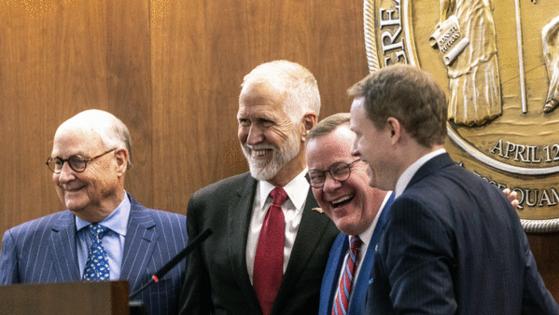Top NC leaders want to allow Bitcoin investments for state pension and budget funds
Published in Business News
A new North Carolina bill would facilitate Bitcoin investments in the state’s public funds for transportation, education, retirement, general spending, and more — potentially creating a strategic reserve of the valuable cryptocurrency.
Sponsored by Republican House Speaker Destin Hall, the NC Digital Assets Investments Act would authorize the state treasurer to purchase certain virtual currencies, primarily Bitcoin, as part of managing pools of money like the Highway Fund and the Teachers’ and State Employees’ Retirement System. Under the legislation, digital assets can comprise up to 10% of any fund.
Hall, who became House speaker in January, said in an X post Monday that the law aligns North Carolina “with President Trump’s vision for a national Bitcoin stockpile” while keeping the state at the forefront of a financial innovation.
Though the bill never mentions Bitcoin, it stipulates that eligible digital assets must have an average market capitalization over the previous year of at least $750 billion, which currently excludes all but one cryptocurrency. The act states the treasurer must invest in exchange-traded products, meaning North Carolina would hold Bitcoin through market funds rather than directly.
Three fellow House Republicans joined Hall as primary sponsors: Rep. Stephen Ross, Rep. Mark Brody, and Rep. Mike Schietzelt, who represents northern Wake County.
In an interview Tuesday with The News & Observer, Democratic Gov. Josh Stein indicated his support for the legislation.
“I’m all for giving people more authority to do their jobs,” he said. “That doesn’t mean that the treasurer must make those investments, but if there are wise investments that can result in a positive, diversified return for the pension fund, then I’m comfortable with the treasurer making that investment.”
Toward a national Bitcoin reserve?
North Carolina is now one of 19 states considering public investments in cryptocurrencies, according to the industry news outlet CoinDesk. A pair of states, Wisconsin and Michigan, already allow crypto in their retirement portfolios.
Momentum for Bitcoin investing at the state level has coincided with President Donald Trump’s calls for a national digital asset reserve tethered to the world’s largest cryptocurrency. Strategic reserves are a stockpile the nation stores for crisis moments, like the U.S. Strategic Petroleum Reserve.
As of Tuesday afternoon, the currency sold at around $96,000. Its price has about doubled over the past 12 months, propelled by a huge spike in November following Trump’s election victory.
In December, Trump named Charlotte native and former Republican congressional candidate Bo Hines to a national leadership role on cryptocurrency. And during his first week in office, Trump issued an executive action creating a working group on digital asset markets.
Criticism of public Bitcoin investing highlight that the 16-year-old currency has been volatile and that large-scale exposure to the asset could necessitate crypto bailouts should the price crater.
North Carolina’s treasurer, newly elected Republican Brad Briner, is in charge of managing $194 billion in total assets, including a $129 billion state pension plan that covers firefighters, teachers, police officers, and state employees. When people buy cryptocurrencies like Bitcoin, they receive a private key that serves as a passcode to their virtual wallet. Under the state bill, all keys would be “exclusively known and accessible” to the state treasurer.
While there are crypto skeptics, Bitcoin believers welcome the chance for North Carolina to add a strategic crypto reserve.
“This is a big deal,” Daniel Spuller, co-chair of the North Carolina Blockchain Initiative, wrote in an X post Monday. Spuller, who worked with Hall on the legislation, said the NC Digital Assets Investments Act stands out from some other states’ efforts because it was introduced by one of the two lead legislators in the General Assembly.
©2025 The News & Observer. Visit at newsobserver.com. Distributed at Tribune Content Agency, LLC.












Comments